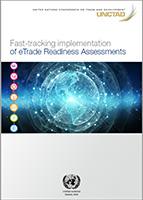
The UNCTAD eTrade Readiness Assessment Programme initiated in 2017 is designed to identify and address challenges to the development of e-commerce in developing countries, particularly least developed countries (LDCs).
UNCTAD conducts demand-driven assessments that provide a thorough overview of the current e-commerce ecosystem in the countries concerned and recommend conducive measures in seven policy areas through a comprehensive action matrix.
UNCTAD has now developed an evaluation and monitoring strategy to assess the progress made in the implementation of the recommendations contained in the assessments and to document good practices, policy impacts and lessons learned.
This report entitled “Fast-tracking implementation of eTrade Readiness Assessments” is UNCTAD’s first comprehensive review of the status of implementation of recommendations outlined in beneficiary countries’ assessments.
It captures the progress made and ranks the implementation levels in 13 out of 18 countries reviewed in the report, namely those that have benefited from an eTrade Readiness Assessment by June 2019. The findings mainly draw on analytical results and further research conducted by UNCTAD based on voluntary questionnaires circulated within the countries.
The report shows that implementation of the recommendations is moving at varying speeds. The overall implementation rate in the 13 surveyed countries stands at 50%, with Cambodia and Myanmar, Senegal and Togo, ranked as the best performers.
Overall, the review has confirmed that priorities outlined in beneficiary countries’ assessments remain relevant for them, but challenges have slowed down efforts to deepen their digital readiness for e-commerce. Weak institutional capacities and policy coordination mechanisms are still major bottlenecks to ensuring adequate follow-up at the national level and further implementation of recommendations.
Countries’ feedback has underscored the untapped potential of more active engagement with eTrade for all partners and the urgent need for targeted support to turn recommendations into bankable projects, through technical assistance on sound project design and to foster dialogue for resource mobilization.
The key findings and recommendations contained in this report will further foster UNCTAD’s role in mobilizing partnerships on the ground to accelerate digital transformation in developing countries, particularly LDCs, in line with the 2030 Agenda for Sustainable Development.


